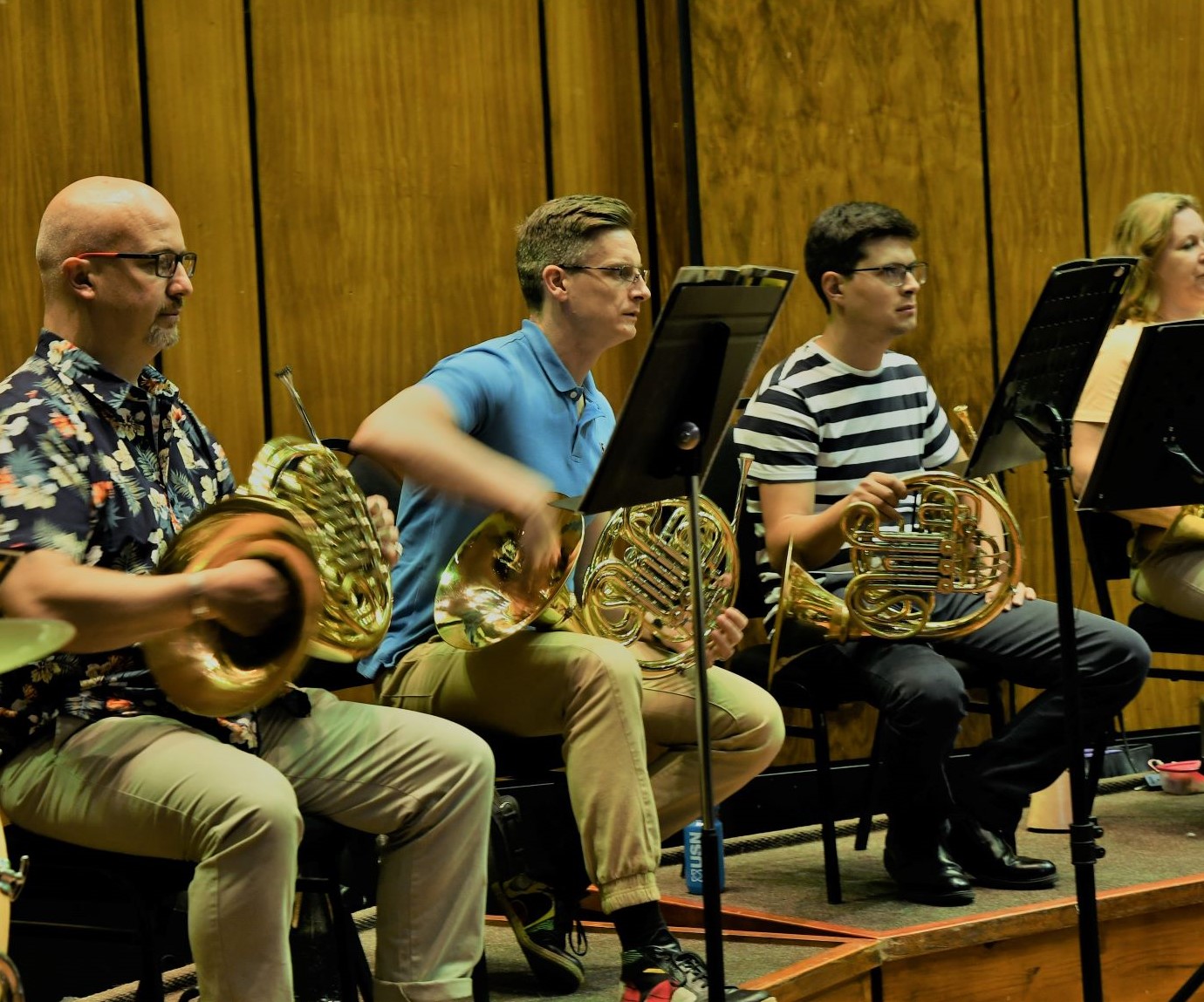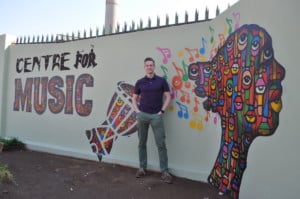Alumni spotlight: Chris Bishop
Thu 25 July 2019We caught up with South African French Horn player and music educator Chris Bishop to find out what he’s been doing since graduating from Trinity Laban in 2005.
Why did you choose to study at Trinity Laban?
My journey into music study came late compared to many of my peers. I had already left school and spent a year studying politics and economics before I decided I couldn’t overlook the (however remote) possibility of pursuing a career as an orchestral musician. I had to return to school, get my Grade 5 theory, my Grade 8 in horn and my Music A Level before gaining a place at the University of Southampton.
The moment I arrived for my audition at Trinity Laban I felt excited by the fantastic environment of the Old Royal Naval College, and Greenwich itself. It was the only audition in which I felt like the panel was on my side and could sense my determination to succeed. I signed up for a foundation course and, encouraged by the audition process, I had improved significantly and was transferred to the Postgraduate Diploma when I arrived.
Trinity Laban’s course content had great appeal. It was clear that they wanted not just to produce fine musicians, but also to produce graduates with the ability to survive in their chosen industry. There was the added bonus that a few of my horn heroes were – and still are – on the staff: Mike Murray (BBC Symphony Orchestra), Roger Montgomery (Principal Horn of the Orchestra of the Age of Enlightenment, Orchestra of the Royal Opera House) and Stephen Stirling, who I admire for his approach to chamber performance.
What were the most valuable things you learnt from Trinity Laban?
The most important skill is self-management. It takes real (and continual) effort to balance practice, travel, rehearsals, concerts, classes, auditions, consultation lessons, teaching and personal time. Trinity Laban also taught me to adapt and diversify. I spent as much of my time playing big band jazz, wind quintet and small group contemporary concerts as I did sitting in an orchestra. I tried to make the most of every learning opportunity from teachers and peers. Inspiration was the other fundamental aspect of my time at Trinity Laban. There was such a high level of investment from my teachers in my progress, as well as other sources of motivation including visiting artists, professional development schemes and a wide range of performance opportunities.
How has your career as a professional musician developed since graduating?
I had a relatively short freelance career in London before winning a position as Associate Principal (3rd/1st) in the Johannesburg Philharmonic Orchestra. It was a very steep learning curve, but the motivation and discipline gained through my studies made the process manageable.
The Johannesburg Philharmonic Orchestra, like many orchestras globally, has faced significant challenges in recent years. It found itself in dire financial straits in 2012 and we are no longer a full-time orchestra, having reduced to 20 weeks or so a year of symphony and ballet work. Obviously, this has had a huge impact on our careers in a city where there is little additional playing work to fill the gap. However, the JPO is a courageous family with a collective desire to keep the orchestra alive.
There has still been the chance for diverse performance experience here in South Africa – I’ve played in a big band with Gregory Porter and accompanied Nas in a stadium performance celebrating 20 years since the release of his debut album Illmatic.

Image: Chris rehearsing with the JPO horn section (courtsey of Johannesburg Philharmonic Orchestra)
You are the Director of Music for Morris Isaacson Centre for Music, a non-profit music centre in Soweto, South Africa. Can you tell us more about the Centre and how it came to be?
I am very proud to be the Director of Music for the Morris Isaacson Centre for Music (MICM), Soweto. I developed my skills as an ensemble and performance coach in London and later in Johannesburg with organisations including MIAGI (Music Is A Great Investment). In 2013 I began coordinating the curriculum at a newly built centre, founded by MIAGI and Cape Gate in Soweto. MICM now has 16 teachers, 114 students and a full programme of activity that covers classical, rock and traditional African music. We provide ensemble and choir rehearsals and theory lessons to ensure broad support for students’ instrumental studies. Excitingly, we’re developing our own syllabi for penny whistle and djembe studies.
Our partnership with the Royal Birmingham Conservatoire, the Arco Project, facilitates additional teaching time each week for many of our string students via the internet, and allows for additional expert advice through courses each year at MICM. Arco has also created opportunities for some students to take part in events and courses in the UK.
Over the past few years we have become increasingly integrated into the local community and we have regular free concerts from our students and from visiting local and international artists. There are frequent workshops with visiting musicians and weekly drum circles open to the public. Our programme now offers psycho-social support for students, parents and teachers through the South African College of Applied Psychology, and additional reading classes to help with students’ literacy.
I am excited by our achievements so far, and draw great inspiration from our students. Several of our students are music scholars at the National School of the Arts, and we are represented in local and national youth orchestras. Our first students are now looking towards further education in music, and taking their next steps into the world of professional performance. Our potential is only limited by our funding; in order to meet demand, we must continue to source income from various avenues, including committed donors who can help us to deliver a high-level programme for as many students as possible.

Image: Chris outside MICM (credit: Lungile Zaphi)
How do you balance being a performing musician with your work at MICM?
Given our reduced duties at the orchestra, I have a good balance between my playing work and my responsibilities at MICM. Changing from 46 weeks to 20 weeks per year means that we have to follow additional avenues for income. As a result, we have far less time for personal practice and we also spend far less time on stage which make some skills more difficult to maintain. I find that my dynamic range is particularly difficult to rehearse away from the orchestra. A triple forte at the back of the band is like nothing you can replicate in a practice room. I have recently experienced a few instances of crippling performance anxiety which have taken me quite by surprise. Moving from experiencing the pressures of the principal chair in live performance every other week to only once every few months is clearly also starting to take its toll.
As I address these new challenges, I can see that my approach to the orchestral profession has developed. Having been part of the industry for 15 years, I realise it is not about being the perfect instrumentalist, although you of course have to be highly proficient. It’s also about having the personality, commitment and adaptability to be a reliable colleague.
Trinity Laban’s Head of Music Education Tim Palmer visited you in June 2019. Can you tell me more about sustaining relationships with Trinity Laban? Why did you invite Tim over to train your teachers?
As a musician and as Director of Music at MICM, it is important that I seek out opportunities to develop and to offer development opportunities to our teaching faculty. I first noticed The Teaching Musician course through Trinity Laban alumni emails. Seeking more information about it, I learned that Tim Palmer had already taught the foundation course in India and decided to see if we could get him here. This week-long programme offers ground work in teaching philosophy, psychology and practice. It promises useful material for all our teachers and is the perfect starting point as we expand our training in different directions.
Advice for aspiring musicians?
Be confident that you have the emotional strength to sustain your career. Practice often but, more importantly, efficiently. Seek out every single teacher and colleague you can for advice and keep doing that throughout your career. You can always be learning ways to improve, and having an open mind keeps you ready to address unexpected challenges. Keep fit and look after your body. Read, and sleep for as long as possible.
What’s next?
Anti-anxiety work! I need to seek out performance opportunities away from the orchestra to keep my hand in at the pointy end of stress levels and I will be looking into a few solo recitals. I’ve also decided to refresh my orchestral excerpts on a regular basis, and I’m planning to start posting videos on Instagram (@chrisbishophorn) in order to ‘expose’ myself to public scrutiny in another way. So, keep an eye out for #ProbespielProject (or #ExcerptsForAnxiety!).
For the rest of 2019, the JPO has another few sets of symphony concerts and a two-week run of Giselle with the Joburg Ballet. There is good news about funding for 2020 too, I believe, so I’m looking forward to sharing the same joy on stage with my colleagues next year, and for many years to come.
My time away from work is increasingly important to me, so I spend as much time as possible with my beautiful wife Rozanne and our two energetic children. I also exercise every day if I can, partly as a mechanism to de-stress and also partly to keep myself in working order for as long as possible!
At the Morris Isaacson Centre for Music, our aim is to attract as much investment as possible to open up opportunities for every child in the area who wishes to take advantage of our programme. My hope is that we can have a lasting positive legacy in the community. We owe it to our industry, and to the students themselves, to produce future generations who are appreciative of the arts, and who have experienced first-hand the huge advantages of music education.
–
Learn more about Trinity Laban’s alumni on our Alumni pages.
To find out more about our brass music faculty, visit our Wind, Brass and Percusssion department pages.
More information on Trinity Laban’s The Teaching Musician and other music education programmes can be found on our study pages.
–
Main image: Chris Bishop (credit: Lungile Zaphi)
